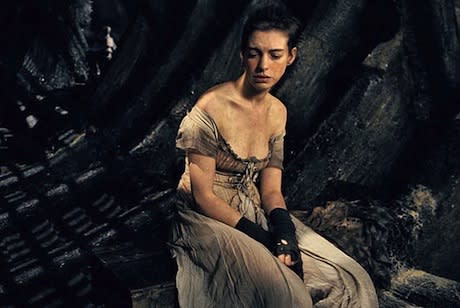Given one word to sum up the operatic, bombastic and entirely humourless spectacle that is this musical adaptation of Victor Hugo novel Les Misérables, one might choose "abrasive." It's abrasive in its grandiose self-importance, beefing up every moment with excessive overacting and bug-eyed, "imperfect" musical performances — sung live, in the moment, on set, to capture a sort of "reality" in the midst of the overblown melodrama — to give the impression of transcending, or giving new life to, the material.
But The King's Speech director Tom Hooper isn't giving new life to anything. He's reiterating the obvious plot machinations of Jean Valjean's (Hugh Jackman) quest for redemption, changing his life course after a kind offer is thrown his way post-parole. Impeccably recorded and, yet again, "abrasive" musical numbers detail the themes matter-of-factly, reminding us of motivations and every broad feeling.
But as Valjean works his way up to mayoral status, again betraying his righteousness by firing young mother Fantine (Anne Hathaway) from his factory, thus sealing her fate as a mortally ill prostitute, the gaudy, even smarmy larger-than-life cinematography and swooping camerawork make it all seem unintentionally funny.
Yes, Anne Hathaway's overdone, screeching performance is impressive, in a hyperventilating, theatrical capacity, stopping the show with her rendition of "I Dreamed a Dream," but anyone familiar with the text knows that it's all downhill from there.
Once Valjean takes on Fantine's daughter, Cosette (Amanda Seyfried), and she gets inadvertently wrapped up in French politics by falling in love with the radical Marius (Eddie Redmayne) — something that inevitably puts Valjean on the spot again, when not avoiding the rigid and absurdly obsessive police investigator, Javert (Russell Crowe) — the film becomes little more than an exercise in repetition.
Scenes open and close with the same epic sensibility, utilizing monolithic, old-fashioned cinematic importance to captivate, or blind, the audience, leaving the hand-held, yet widescreen handling of the musical moments and stoic severity in between to drudgingly rehash a story that hasn't been infused with anything new.
We're treated to the same notions of mankind's capacity to change and the simultaneous importance and detriment of sticking to one's values and ideology, only with a bunch of superfluous filler and gauche pomposity thrown in to seemingly give it relevance.
If Hooper had taken any sort of structural or thematic risk, beyond putting a veil over the audience's eyes via sheer sensationalism and showboating, this could have been an appealing story to tackle in a modern context.
Unfortunately, this just feels like a very pricy marketing plot to keep a mostly redundant musical alive and make a bit of money while doing so.
(Universal)But The King's Speech director Tom Hooper isn't giving new life to anything. He's reiterating the obvious plot machinations of Jean Valjean's (Hugh Jackman) quest for redemption, changing his life course after a kind offer is thrown his way post-parole. Impeccably recorded and, yet again, "abrasive" musical numbers detail the themes matter-of-factly, reminding us of motivations and every broad feeling.
But as Valjean works his way up to mayoral status, again betraying his righteousness by firing young mother Fantine (Anne Hathaway) from his factory, thus sealing her fate as a mortally ill prostitute, the gaudy, even smarmy larger-than-life cinematography and swooping camerawork make it all seem unintentionally funny.
Yes, Anne Hathaway's overdone, screeching performance is impressive, in a hyperventilating, theatrical capacity, stopping the show with her rendition of "I Dreamed a Dream," but anyone familiar with the text knows that it's all downhill from there.
Once Valjean takes on Fantine's daughter, Cosette (Amanda Seyfried), and she gets inadvertently wrapped up in French politics by falling in love with the radical Marius (Eddie Redmayne) — something that inevitably puts Valjean on the spot again, when not avoiding the rigid and absurdly obsessive police investigator, Javert (Russell Crowe) — the film becomes little more than an exercise in repetition.
Scenes open and close with the same epic sensibility, utilizing monolithic, old-fashioned cinematic importance to captivate, or blind, the audience, leaving the hand-held, yet widescreen handling of the musical moments and stoic severity in between to drudgingly rehash a story that hasn't been infused with anything new.
We're treated to the same notions of mankind's capacity to change and the simultaneous importance and detriment of sticking to one's values and ideology, only with a bunch of superfluous filler and gauche pomposity thrown in to seemingly give it relevance.
If Hooper had taken any sort of structural or thematic risk, beyond putting a veil over the audience's eyes via sheer sensationalism and showboating, this could have been an appealing story to tackle in a modern context.
Unfortunately, this just feels like a very pricy marketing plot to keep a mostly redundant musical alive and make a bit of money while doing so.
